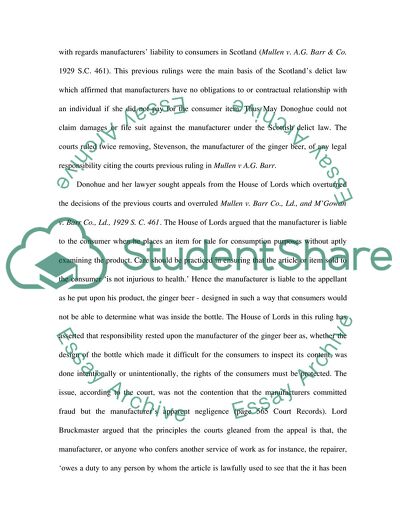
- Home
- Free Samples
- Premium Essays
- Editing Services
- Extra Tools
- Essay Writing Help
- About Us
- Studentshare
- Subjects
- Miscellaneous
- Identify and analyse ONE case from an appeal court in either Scotland, England or another English speaking jurisdiction which has had a profound effect on one o
Identify and analyse ONE case from an appeal court in either Scotland, England or another English speaking jurisdiction which has had a profound effect on one o - Essay Example

- Subject: Miscellaneous
- Type: Essay
- Level: Undergraduate
- Pages: 4 (1000 words)
- Downloads: 0
- Author: watsicawalker
Extract of sample "Identify and analyse ONE case from an appeal court in either Scotland, England or another English speaking jurisdiction which has had a profound effect on one o"
Later on, May complained of stomach pains, which the doctor diagnosed later as gastroenteritis. May, furthermore, complained that she had suffered from emotional anguish after the incident. Consequently, May Donoghue filed an action suit against the manufacturer of the ginger beer, David Stevenson, in April of 1929 seeking £500 as payment for the damages inflicted as a result of drinking the ginger beer (1 page 563 Court Records).1 The consequences of the suit – Donoghue v Stevenson - and the events which ensued later still stand as one of the most prominent cases in United Kingdom’s legal history and changed the course of consumer law perpetually, as the decision of the House of Lords, UK’s supreme appeals court, established a very significant foundation of the delict law not just in Scotland but also all over the world.
The House of Lords affirmed that scope of their judgment principles covered English Law as well (page 564 Court Records).2 Donoghue lodged her case in Court of Session in 1929 with the help of Walter Leechman who at that time was already familiar with the previous rulings of the courts with regards manufacturers’ liability to consumers in Scotland (Mullen v. A.G. Barr & Co. 1929 S.C. 461). This previous rulings were the main basis of the Scotland’s delict law which affirmed that manufacturers have no obligations to or contractual relationship with an individual if she did not pay for the consumer item.
Thus May Donoghue could not claim damages or file suit against the manufacturer under the Scottish delict law. The courts ruled twice removing, Stevenson, the manufacturer of the ginger beer, of any legal responsibility citing the courts previous ruling in Mullen v A.G. Barr. Donohue and her lawyer sought appeals from the House of Lords which overturned the decisions of the previous courts and overruled Mullen v. Barr Co., Ld.,
...Download file to see next pages Read MoreCHECK THESE SAMPLES OF Identify and analyse ONE case from an appeal court in either Scotland, England or another English speaking jurisdiction which has had a profound effect on one o
English Legal System: Court Observation Visit
Hierarchical Structure of the Court System in England and Wales
English Jurisdiction
Briefly outline the court system in England and Wales, and in particular the role of the Crown Court
Variations between England and Scotland
The Court of Appeal of England and Wales
Arbitration Act England 1996 and Arbitration Act Scotland 2010
The Benefits and Disadvantages of Law on Expansion of the Jurisdiction of the DIFC Court

- TERMS & CONDITIONS
- PRIVACY POLICY
- COOKIES POLICY